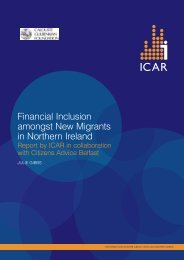Uncovered: assessing media and communications needs ... - ICAR
Uncovered: assessing media and communications needs ... - ICAR
Uncovered: assessing media and communications needs ... - ICAR
- No tags were found...
Create successful ePaper yourself
Turn your PDF publications into a flip-book with our unique Google optimized e-Paper software.
Isolated rural organisations• Underst<strong>and</strong>ing how journalists think <strong>and</strong> work• How to produce attractive newsletters• Using the <strong>media</strong> to recruit volunteers <strong>and</strong> trustees• Need for mentoring <strong>and</strong> ongoing accessible support• Tapping into local expertise <strong>and</strong> funding possibilities5.1 Attitudes to <strong>media</strong> <strong>and</strong> <strong>communications</strong>The study found that all sectors recognised the importance of effective <strong>communications</strong> <strong>and</strong> felt theycould benefi t from improving their skills in this area. Attitudes towards the <strong>media</strong> varied across thesectors although all agreed there might be value in increasing their underst<strong>and</strong>ing <strong>and</strong> expertise indealing with it.Wariness of the <strong>media</strong> was possibly most acute amongst those most recently arriving in the UK,namely migrant workers <strong>and</strong> asylum seekers, <strong>and</strong> refugees. Representatives of these communitiesin the UK along with representatives of Islamic organisations shared the view that some sections ofthe <strong>media</strong> were hostile to them. Members of refugee organisations however also exhibited some ofthe most optimistic attitudes about what journalists could contribute to improve underst<strong>and</strong>ing <strong>and</strong>community cohesion.Representatives of BME, faith <strong>and</strong> rural voluntary <strong>and</strong> community organisations highlighted thescarceness of coverage about their activities, rather than outright hostility, <strong>and</strong> attributed this toignorance <strong>and</strong> disinterest on the part of journalists. Individuals across the sectors expressed aninterest in learning how to journalists make decisions about news-worthiness <strong>and</strong> how to identify <strong>and</strong>write stories that would make it into print.Individual migrants, refugees <strong>and</strong> many black <strong>and</strong> minority ethnic people showed limited interest in thetabloid or broadsheet press, preferring newspapers targeted at their own religious or ethnic groups.The internet is also becoming an increasingly popular source of news <strong>and</strong> information across allsectors.Almost all groups were using computers <strong>and</strong> the internet <strong>and</strong> identifi ed this as fertile ground fordevelopment. Voluntary <strong>and</strong> community groups in rural areas were particularly interested in developingtheir capabilities in desk-top publishing. This was also true of BME <strong>and</strong> faith organisations, whilerefugee <strong>and</strong> migrant organisations wanted help writing effectively for different audiences.5.2 Current availability of trainingAmongst those taking part in this research people from faith <strong>and</strong> BME organisations had received theleast amount of training in <strong>media</strong> or <strong>communications</strong>. Those in the latter category, along with people inrural areas relied heavily on informal contacts <strong>and</strong> family members to fi ll the skills gaps.Nationally, a number of faith organisations run their own <strong>media</strong> training courses which are sometimesoffered across denominations. At the local level some training is provided, but there is also uncertaintyabout who may be authorised to speak for a particular organisation or community of people. Somefaith representatives expressed doubt about the need to engage with the <strong>media</strong> at all.Training is provided by some national bodies involved with refugee <strong>and</strong> BME organisations, although<strong>media</strong> <strong>and</strong> <strong>communications</strong> may be just a small part of much broader skills programmes <strong>and</strong> not seenas a priority for many small voluntary <strong>and</strong> community groups.<strong>Uncovered</strong>: <strong>assessing</strong> <strong>media</strong> <strong>and</strong> <strong>communications</strong> <strong>needs</strong> <strong>and</strong> capacity of marginalised communities39
















